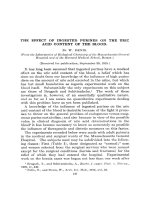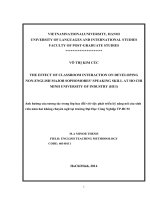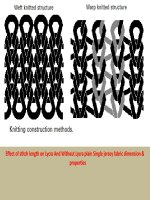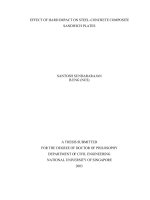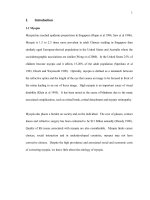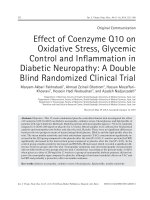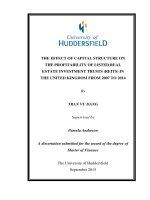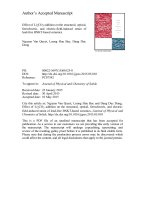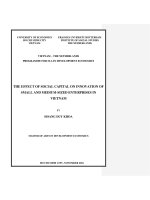THE EFFECT OF INGESTED PURINÉ ON THE URIC
Bạn đang xem bản rút gọn của tài liệu. Xem và tải ngay bản đầy đủ của tài liệu tại đây (338.35 KB, 9 trang )
THE EFFECT OF INGESTED PURINES ON THE URIC
ACID CONTENT OF THE BLOOD.
Br W. DENIS
(Prom the Laboratories
of
Biological Chemistry of the Massachusetts General
Hospital and of the Harvard Medical School, Boston.)
(Received for publication, ‘September 30, 1915.)
It has long been assumed that ingested purines have a marked
effect on the uric acid content of the blood, a belief which has
risen no doubt from our knowledge of the influence of high purine
diets on the amount of uric acid excreted in t,he urine, but which
has but small foundation as regards experimental work on the
blood itself. Substantially the only experiments on this subject
are those of Brugsch and Schittenhe1m.l The work of these
investigators is, however, of an essentially qualitative nature,
and so far as I am aware no quantitative experiments dealing
with this problem have as yet been published.
A knowledge of the influence of ingested purines on the uric
acid content of the blood is desirable because of the light it prom-
ises t,o throw on the general problem of cndogenous versus exog-
enous purine metabolism; and also because in view of the possible
value in clinical diagnosis of uric acid dcterminat,ions in the
blood2 it has become necessary t,o know as accurat,ely as possible
the influence of therapeutic and dietetic measures on this factor.
The experiments recorded below were made mit,h adult paCents
in the medical and surgical wards of the Massachusetts General
Hospital. The subjects used may be subdivided into the follow-
ing classes: First (Table I), those designat,ed as LLnormal;” men
and women selected from the surgical services who were normal
except for the surgical conditions (hernia and fractures) for the
relief of which they had entered the hospit,al. Experimental
work on the hernia cases was begun not less than one week aft,er
’ Brugsch, T., and Schittenhelm, A., Ztschr. f. exper. Path. u. Thc~np).,
1907, iv, 440.
2 Folin, O., and Denis, W., Brch.
Int.
Med., 1915, xvi, 33.
147
148 Ingested Purines and Uric Acid of Blood
operation, and in the fracture cases three t,o four weeks had elapsed.
Second (Table II), nephritic and cardiorenal cases. Third
(Table III), persons suffering from various chronic diseases not
associated with kidney inefficiency or wit,h fever.
In some cases it was found more convenient on account of the
patient’s physical condition or former diet to feed first a purine
free diet and then one rich in purine, in other cases it was neces-
sary to reverse this procedure. In every case the diet was the
same; during the purine free period the food consisted of eggs,
bread, milk, cheese, butter, and fruit. During the period of
high purine feeding the eggs and a large part of the bread were
replaced by a daily ration of 150 grams of calves’ liver, 200 grams
of roast beef or chicken, and 200 cc. of “concentrated brot.h”
(prepared by boiling down the ordinary hospit,al soup to one-
fifth of its original volume).
Samples of blood were taken at the end of the high purine period
and at the end of the period during which a purine free diet was
given, care being taken to draw blood only before breakfast so
as to obviate any possible effect of a recent meal. Besides t,hc
determinations of uric acid and non-prot,ein nitrogen in the blood
I have also made daily determinat,ions of the uric acid in the
urine3
From the results given in Table I it is evident that in normal
individuals it is possible to feed large amounts of purine-contain-
ing food without increasing the uric acid content of the blood.
It is true that the number of experiments is not large, and also
that the experimental material was carefully selected in order t.o
obtain individuals who gave a history of absolut,e freedom from
any joint diseases (to exclude gout) and who were as far as it
was possible to ascertain by physical and clinical examinations
free from any signs of kidney inefficiency. It is possible that, in
a large series of less carefully selected “normal” material a few
individuals might be found whose tissues and kidneys might be
unable to cope with the large amount of purines ingest,ed and who
would under the same experiment,al conditions be found to have
an increase in t.he circulating uric acid.
3 These dcterminutions were made by the methods of Folin and Denis,
Jour. Biol. Chem., 1912-13, xiii, 469; 1911-12, si, 527; 1913, xiv, 95.
W. Denis 149
TABLE I.
‘(Normal” Sub,jeets.
Urine
-
-
Blood 100 gm.
mg .
36
33
32
30
-
_-
._
WT.
2.0
2.0
2.3
2.2
oglo
0.1s
0.70
0.30
5
5
28
25
2.2
2.1
0.68
0.41
5
5
-
5
5
34
32
1.8
1.9
1.4
1.4
1.12
0.48
-
1
5
5
28
30
0.6;) 7
0.98 6
30 2.0 0.30
8
30 2.2 0.72 5
28
27
1.3
1.3
0.36 10
1.16 5
-
-
Remarks.
Diet.
NcG. 27. Female, 18 yrs. old,
weight 50.4 kg.,
fractured femur
High purine.
Purine free.
A. D. 27. Female, 21 yrs. old,
weight 59 kg.,
fractured femur
High purine.
Purine free.
A. s.
27. Female: 64 yrs. old,
weight 68 kg.,
fractured femur
High purine.
Purine free.
C.O.A. Male, 21 yrs. old,
weight 77.4 kg.,
fractured femur
High purine.
Purine free.
M. 28. Male, 44 yrs. old,
weight 102 kg.,
convalescent
after operation
for hernia
Purine free.
High purine.
O’B. 29. Male, 25 yrs. old,
weight 58 kg.,
convalescent,
after operation
for hernia
Purine free.
High purine.
F. A.*
Male, 28 yrs. old,
weight 67 kg.,
fractured femur
Purine free.
High purine.
* In addition to the meat and liver served to the other subjects this
man was also given 225 gm. of thymus per day.
150 Ingested Purines and Uric Acid of Blood
As was to be expected the experiments presented in Table II
show that in the case of individuals with impaired kidney function
high purine feeding causes an increase in the uric acid content
of the blood.
The patients used for the experiments presented in Table III
suffered from a variety of pathological conditions, and as is to
be expected from such heterogeneous material in some cases a
marked increase in circulating uric acid was observed while in
other cases high purine feeding was without effect.
Experiments (unpublished) on normal men have shown that
the protein intake may be increased from an amount sufficient
to give 6 to 8 grams of urea in the twenty-four hour urine to that
sufficient to produce a daily urea excretion of 30 to 50 grams
without producing an increase of more than 2 to 3 per cent in
the circulating urea.
From the results just presented it would seem that the normal
kidney reacts towards an excess of uric acid in a way essentially
similar to that in which it conducts it,self towards an excess of
urea, and is able to excrete the excess of uric acid presented to it
when a diet high in purines is fed, thereby keeping the circulating
uric acid at the same level as that obtained when only endogenous
uric acid is to be excreted.
When damage to the kidney has occurred (even when this has
not progressed to the point when nitrogen retention is apparent,
as shown by the non-protein nitrogen values) an accumulation of
uric acid takes place in the blood after a short period of purine
feeding.
Both from the theoretical and from the practical side it would
of course have been of interest to have extended this series of
observations to another class of pathological material and to
have included results obtained on persons suffering from gout.
Absolutely characteristic cases of gout are difficult to secure in
conditions suitable for work of this kind, as during the experi-
mental period it is of course necessary to exclude medication of
any kind. As no suitable material of this class has been avail-
able in the several months during which this work has been car-
ried on I have been unable to secure any experimental data along
this line. From the practical standpoint, however, the results
W. Denis 151
TABLE II.
Renal
and Car&renal
Cases.
Blood 100 gm.
Urine
Diet.
WI.
m?.
42 2.0
49 4.4
Purine free.
High purine.
40 2.0 0.46
46 2.4 0.80
Purine free.
High purine.
37
48
1.3
2.1
-
I.
-
-
-
0.39
0.68
Purine free.
High purine.
32
1.8
0.29
8
Purine free.
39 3.8 0.52 4
High purine.
40
54
4.1
4.4
0.27
0.65
5
4
Purine free.
High purine.
30
42
1.8
0.33
10
2.6 0.60 4
-
-
Purine free.
High purine.
_-
-
Remarks.
R. A. 31. Male, 46 yrs. old,
weight 76 kg.,
alcoholic, car-
diorenal disease,
edema, ascites
H. 0. 31. Male, 43 yrs. old,
weight 77 kg.,
hypertension,
art,eriosclerosis,
cardiorenal dis-
ease
R. Y. 7. Male, 42 yrs. old,
weight 72 kg.,
aortic disease,
cardiac hyper-
trophy, arterio-
sclerosis
F. 0.
7.
Male, 42 yrs. old,
weight 62.5 kg.,
chronic i n t e r-
stitial nephritis,
edema, ascites
H. J. 31. Male, 26 yrs. old,
weight 54 kg.,
cardiorenal dis-
ease
W. H. 31. Male, 55 yrs. old,
weight 79 kg.,
cardiorenal dis-
ease
152 Ingested Purines and Uric Acid of Blood
TABLE II-Continued.
Remarks.
I. G. 31. Male, 65 yrs. old,
weight 61 kg.,
chronic lead poi-
soning, arterio-
sclerosis, chron-
ic interstitial
nephritis
N. E. 16. Female,50yrsold,
weight 54 kg.,
acute pyelone-
phrosis of left
k i d n e y (right
kidney excised 8
months ago)
R. I. 31. Male, 64 yrs. old,
weight 71 kg.,
hypertension,
cardiorenal dis-
ease
Blood 100 gm.
w.
66
80
66 1.8
81 2.6
32
2.2
35 2.8
mg.
3.6
4.8
0.38
0.81
Days.
Diet.
6 Purine free.
4 High purine.
10
5
5
5
Purine free.
High purine.
Purine free.
High purine.
W. Denis
TABLE III.
153
Diet.
Urine
Days
mg. mQ.
om.
28 2.0 0.60
27 1.9 0.28
5.
5
High purine.
Purine free.
0.29
0.66
5
3
-
Purine free.
High purine.
0.26
4
Purine free.
0.40 6
High purine.
Blood 100 gm.
26
30
28
28
1.8
1.8
1.2
1.2
28 1.8 0.78 4 High purine.
24
1.8 0.39
4
Purme free.
31
2.0
0.33 5
Purine free.
40
2.4 0.69 5 High purine.
35
3.3
0.36 7
34 3.6 0.98 3
Purine free.
High purine.
-
28 2.3 0.64 4
25 1.5 0.28 5
High purine.
Purine free.
Remarks.
L. 0. I. Male, 32 yrs. old,
weight 50 kg.,
hypertrophic ar-
thritis
F. K. 16. Female, 24yrs old,
weight 46 kg.,
gonorrhea1 ar-
thritis
C. 0. 31. Male, 59 yrs. old,
weight 50.5 kg.,
jaundice, prob-
ably due to ma-
lignant growth of
gall-bladder
H. L. 31. Male, 46 yrs. old,
weight 77 kg.,
mitral regurgi-
tationandstcno-
sis
,;. J<. 31. Male, 34 yrs. old,
weight 70 kg.,
alcoholic, syphi-
liticmyocarditis
>I. 0. 31. Male, 52 yrs. old,
weight 90 kg.,
cardiac decom-
pensation, auri-
cular fibrillation
G. N. 31. Male, 25 yrs. old,
weight 55 kg.,
chronic colitis
154 Ingested Purines and Uric Acid of Blood
TABLE III-Continued.
Remarks.
C. A.*
Male, 22 yrs. old,
weight 78 kg.,
syphilis
-
W. Y. 25. Male, 66 yrs. old,
weight 85 kg.,
convalescent
after excision of
epithelioma of
ear
W. D. 7. Male, 47 yrs. old,,
weight 100 kg.,
aortic and mitral
disease, marked
decompensation
L. M. 7. Male, 28 yrs. old,
weight 47 kg.,
lung abscess
(convalescent
after drainage)
S. I,. 7. Male, 21 yrs. old,
weight 63 kg.,
tabes mesenter-
ica
I
Blood 100 gm
mg.
42
28
44 2.6 0.90
5
High purine.
36 1.8 0.43
4
Purine free.
30
30
30
30
37
37
9
P
.E
D
mg.
3.8
1.7
4.4
4.4
2.5
2.2
1.4
1.7
-I
0.47
0.80
0.59
0.28
3.31
3.64
-
Days.
4 High purine.
6
Purine free.
5 Purine free.
4 High purine.
Diet.
Purine free.
High purine.
High purine.
Purine free.
* In addition to the purine-containing foods given the other patients
this man received daily 250 gm. of thymus.
already published by Folin and Denis show that in the blood
of persons suffering from gout normal uric acid values are not
obtained after several days’ abstinence from all purine-containing
foods.
4 Folin and Denis, Arch. Int. &fed., 1915, xvi, 33.
W. Denis 155
SUMMARY.
Results are presented showing the effect of purine free and of
high purine diets on the uric acid content of the blood of normal
men and of persons suffering from various chronic diseases.
In
normal men no increase in the circulating uric acid is produced
by the ingestion of large quantities of purines. In persons suf-
fering from renal insufficiency a more or less marked increase in
the uric acid content of the blood is produced by high purine
feeding. It is therefore concluded that when the determination
of uric acid in the blood is undertaken as a diagnostic test t,he
insistence on a preliminary period during which no purine-con-
taining foods are consumed is unnecessary except in cases in which
kidney insufficiency exists, or perhaps in the case of persons who
habitually consume extremely large quant,ities of purine- cont,ain-
ing foods.
